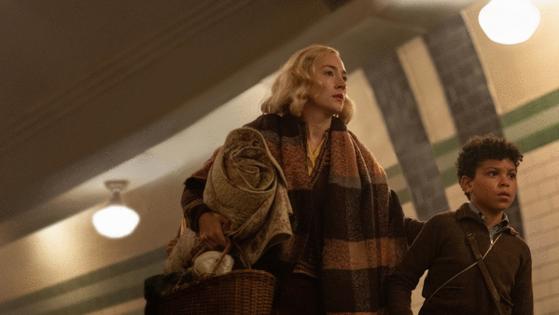Review: 'Blitz' stars Saiorse Ronan as a 1940 wartime Londoner searching for her son
Published in Entertainment News
“Blitz” is writer-director Steve McQueen’s wartime survival drama, consistently tense and persistently string-pulling. It relays a story of London in 1940 under attack, with a protagonist that never would’ve had the chance to center a screen narrative when McQueen was growing up.
Some of the images evoke a harrowing chunk of history in intimately observed ways. These moments are grand, as is McQueen’s skill across many genres. Much of “Blitz,” however, settles for immaculate grandiosity, which is a surprise coming from a director whose “12 Years a Slave” (2013) and the five-part anthology “Small Axe” (2020), very different achievements, were my favorites of their respective years.
We meet 9-year-old George, played by Elliott Heffernan, in a cocoon of relative safety. He and his mother Rita, a munitions factory worker and sometime singer portrayed by Saoirse Ronan, live with George’s granddad (Paul Weller) in their east London Stepney flat. Rita is white; biracial George, who never knew his father (the film reveals why in due course), has known his unfair share of prejudice, tempered by a home filled with support and love.
The German Luftwaffe bombing raids, which ultimately killed more than 40,000 English civilians, led many families to send their children to the countryside, away from London. McQueen’s screenplay does likewise, starting in London, traveling away and then back again. Early on, a deeply conflicted Rita sees her scared, angry son off at the railway station. George’s parting words further crack Rita’s already half-broken heart: “I hate you.”
Aboard the train, George — desperate to rejoin his family at risk in London — befriends two other boys, brothers and rebels. For a brief spell, George’s spirits lift. Then, after a leap off the moving rain, a lonely George makes his way back to London and “Blitz” becomes a Dickensian odyssey, stuffed to bursting with constant peril in neatly established chapters.
There are blessings along the way. George has the great luck to encounter a Nigerian-born air raid warden (Benjamin Clémentine), who in one London Underground scene reminds a terrified gaggle of mostly white British subjects, many hostile, many racist, in the necessity of neighborly concern. “We are all equal members of this country,” he reminds them. “Whether we like it or not.” Anachronistic? Idealistic? The answer is yes: Some of “Blitz” is both.
Every savior has an opposite in this nightmare. George later runs afoul of corpse-looting pickpockets — historically factual, yes, but as acted and staged, more in line with a regional theater production of “A Christmas Carol,” with Old Joe and Scrooge’s maid doing dirty work. Meanwhile, Rita joins a Socialist-run volunteer effort for her fellow Londoners. Cross-cutting between son and mother, and their constant efforts to reunite among the carnage, flames and rubble before it’s too late, director McQueen keeps the screws tight, blowing past realism for a trickier realm of historically grounded but highly stylized imagination. One example: There’s an extended musical break in a swank nightclub sequence, full of jitterbugging revelers about to rue the day they decided to hit the town in the middle of not just a blitz, but the Blitz.
As I suppose it must, “Blitz” layers a full spread of digital effects atop its formidable production and costume design work, affording us panoramic views of wiped-out neighborhoods and some egregious close-ups of whistling digital bombs sailing toward Earth. I don’t know if there are any reliable rules of thumb in filmmaking, but if there are, one of them surely is this: If Michael Bay did it in “Pearl Harbor,” then a talent like Steve McQueen shouldn’t copy it.
Even when “Blitz” recalls the gaming-style action rhythm of “1917,” with a similar thinness of character, Ronan and Heffernan invest fully in their characters’ life-and-death narrative. Viewers will, too, because everything in the movie works as one to pull every string we have as spectators. McQueen has broadened the racial, cultural and humanistic array of London Blitz and wartime Britain movies in a single stroke. More frustratingly, he packs a 600-page “Oliver Twist” amount of incidents into a very short timeline. This may be an untenable objection, for what is war if not the worst imaginable sudden death, surrounded by different, hellish circles of suffering? But what’s missing, for me, is the psychic breathing room any story about a single individual in these circumstances needs to really put us there. Wherever “there” is.
———
'BLITZ'
2.5 stars (out of 4)
MPA rating: PG-13 (for thematic elements including some racism, violence, some strong language, brief sexuality and smoking)
Running time: 2:00
How to watch: Now in theaters and streaming on Apple TV+ Nov. 22
———
©2024 Chicago Tribune. Visit chicagotribune.com. Distributed by Tribune Content Agency, LLC.













Comments